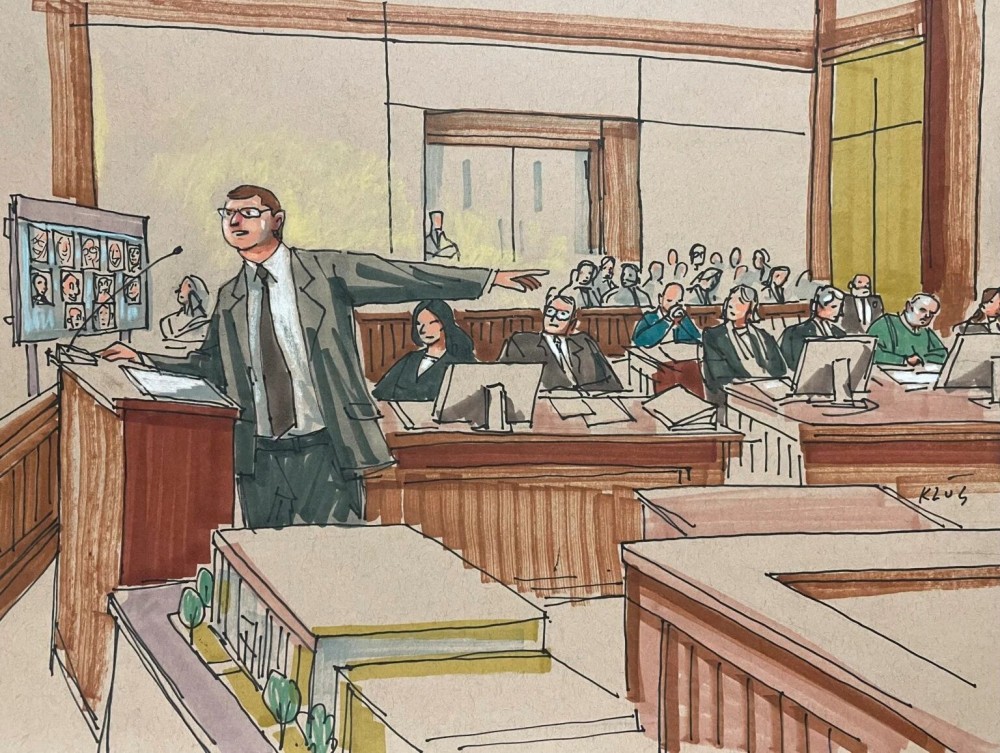Pittsburgh synagogue shooter will be sentenced to death, jury finds

US Attorney Eric Olshan argues before a federal jury on July 31 that Robert Bowers should receive the death penalty. Bowers, wearing green, was previously found guilty of killing 11 people int he deadliest antisemitic attack in US history. (Dave Klug via AP)
Nearly five years since he entered the Tree of Life synagogue in Pittsburgh, Pennsylvania, and methodically slaughtered 11 Jewish congregants, Robert Bowers will face the death penalty after a jury unanimously decided that he deserved the maximum sentence for each of the murders. His attack is the worst act of antisemitism in US history.
Shortly before noon on Wednesday, the federal judge in the case, Robert Colville, reviewed how the jurors voted on each of the 115 mitigating factors they were asked to consider. None of the jurors were persuaded by arguments that Bowers had brain abnormalities, suffered from schizophrenia, or was motivated by delusional beliefs about Jewish people being used by Satan to bring about the end of the world.
Ronald S. Lauder, president of the World Jewish Congress, said after the verdict was announced, “Today’s decision represents a measure of justice for the slaughter of 11 Jewish worshippers on that fateful day in 2018 at the Tree of Life synagogue. Nothing can ever bring back the people killed in the attack, the deadliest act of antisemitism in the history of the United States.”
In the coming days, survivors of the attack will address the court about the impact of the massacre on their lives. Appeals may delay his execution, however, for years to come.
On October 27, 2018, Bowers, a truck driver from the Pittsburgh suburb of Baldwin, drove to Tree of Life synagogue in the Squirrel Hill neighborhood, the heart of Pittsburgh’s Jewish community, where three congregations were holding Shabbat services. After the defendant shot the 11 of the gathered worshippers with an AR-15 rifle, he reportedly told law enforcement that “Jews are the children of Satan,” and told a SWAT officer that “all these Jews needed to die.”
Of the nine victim families (the 11 victims included two brothers and a married couple), seven have previously indicated support for the death penalty.
On July 13, the jury found Bowers, 50, guilty of all 63 charges, including 22 capital offenses, and days later found he was eligible for the death penalty under Pennsylvania law. As the trial began, Bowers’ lawyers offered a guilty plea in exchange for a life sentence, an offer the prosecution rejected.
The jury began deliberations Tuesday morning, following instructions in a 26-page jury response form that told them to weigh aggravating factors against mitigating factors. The form listed Bowers’s apparent lack of remorse and bias against members of the Jewish faith as aggravating factors, while the mitigating factors included his reported brain abnormalities, history of attempted suicide, and the defense’s claim that Bowers was motivated by a “delusional belief” that Jewish people are tools of Satan in a war between Satan and God.
A few minutes after going into deliberations, the jury requested to see the weapons Bowers used in the shooting and were ushered back into the courtroom to view them. But after a marshal standing nearby answered jurors’ questions about the weapons, the defense called for a mistrial, saying the marshal’s comments were not evidence. The judge denied the motion for a mistrial but instructed the jury to disregard their discussion with the marshal.
In making closing arguments in the sentencing phase on Monday, federal prosecutors argued that Bowers deserved “the most severe punishment under the law,” citing his unchecked antisemitism and consistent lack of remorse.
“He turned an ordinary Jewish Sabbath into the worst antisemitic mass shooting in US history, and he is proud of it,” said prosecutor Eric Olshan.
The defense appealed to jurors’ empathy, citing Bowers’s mental health struggles and traumatic childhood, which they claimed contributed to his having delusional beliefs.
“All we can really do is make the right decision going forward,” said defense attorney Judy Clarke, “And that is life.” —Religion News Service


